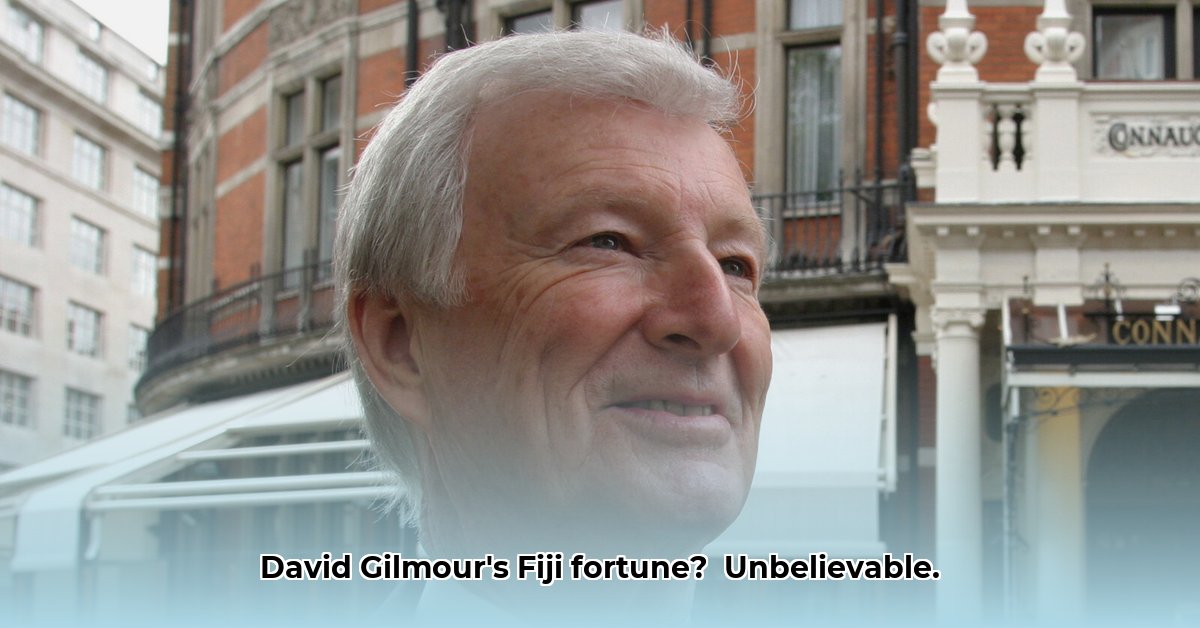
David Gilmour's name is inextricably linked with Fiji Water, a brand synonymous with luxury and pristine hydration. But the story behind his wealth extends far beyond bottled water, encompassing shrewd investments, calculated risks, and unavoidable controversies. This article explores the multifaceted journey of a businessman who built a global empire, examining both his triumphs and the challenges – especially those surrounding the environmental impact of his most famous venture.
Gilmour's Entrepreneurial Journey: From Hi-Fi to Hydration
Gilmour's career began far from the sparkling waters of Fiji. Early ventures into hi-fi systems with Clairtone demonstrated an entrepreneurial spirit and an eye for untapped markets. This early success laid the groundwork for future ventures, showcasing his ability to identify and capitalize on emerging trends. His later foray into the mining industry with Barrick Gold further diversified his portfolio, mitigating risk and building a solid foundation for future growth. He understood that true wealth isn't built on a single venture, but on a carefully constructed network of diverse, well-managed enterprises. How did this early diversification inform his later, more impactful ventures? It's a question that underscores the importance of strategic planning in long-term business success.
But it was his investment in Fiji Water that catapulted Gilmour to international prominence. His vision—to market Fijian water as a premium product—was not without risk. Securing the necessary rights and investments required navigating complex legal and logistical hurdles. Yet, his belief in the intrinsic value of Fiji's pristine water proved prescient. The subsequent success of Fiji Water, a testament to his exceptional business acumen, cemented his place among the world's most successful entrepreneurs. Did he anticipate the levels of growth and, critically, the controversies that ultimately followed? The answer remains somewhat elusive.
The Fiji Water Enigma: Profitability and Environmental Concerns
Fiji Water’s meteoric rise is undeniable, transforming a relatively obscure resource into a global luxury brand. The company’s marketing strategy—positioning Fiji Water as a symbol of exclusivity and an elevated lifestyle—played a crucial role in this success. However, this success has been accompanied by significant and ongoing environmental concerns. The vast quantities of water bottled and shipped globally consume considerable energy and generate substantial plastic waste, raising questions about the sustainability of the business model. While efforts have been made to improve the company's environmental profile, these have been subject to considerable debate, indicating the ongoing need for increased transparency and a more comprehensive assessment of Fiji Water's true environmental footprint. What specific environmental regulations did Fiji Water's operations impact, and to what extent? A comprehensive analysis of this remains a challenge due to limited public data.
Quantifying Gilmour's Wealth: An Unanswerable Question
Determining the precise value of Gilmour's net worth is a challenging task. The sale of companies like TrizecHahn, involvement in diverse sectors and the eventual sale of Fiji Water itself have made determining a precise figure impossible. Public records offer only a partial picture of his wealth, leaving a significant gap in the publicly available information. While it's clear his assets are substantial, exact figures are difficult to confirm without access to private financial data. The precise financial details remain elusive, underscoring the difficulties inherent in assessing the real-time value of privately held assets across various sectors.
Wakaya Perfection: A Shift Towards Sustainability?
Gilmour's recent venture, Wakaya Perfection, presents a contrasting approach. Unlike Fiji Water, the ginger-products focus on sustainable practices, sourcing ingredients directly from Gilmour's own Fijian land. The emphasis on local production and environmental responsibility is a stark departure from the criticisms leveled at Fiji Water, suggesting a potential evolution in Gilmour's business philosophy. However, the high price point, currently at $24 for 0.6 ounces of ginger, raises concerns about the product's market reach. The long-term sustainability and impact of this new venture require further observation and analysis.
Conclusion: A Legacy of Success and Ongoing Debate
David Gilmour's journey is a compelling case study in entrepreneurial success and adaptation. His diverse investments, innovative marketing strategies, and ability to identify and exploit market opportunities have undeniably yielded substantial wealth. However, the story of Fiji Water highlights the complexities of balancing economic achievement with ethical and environmental responsibility. While the precise extent of Gilmour's net worth remains shrouded in some mystery, the lasting impact—both positive and negative—of his business empire is undeniable. His story offers valuable lessons for aspiring entrepreneurs, underscoring the importance of considering sustainability and transparency alongside ambition and profit. The ongoing debate illuminates the crucial need for more thorough examinations of how large-scale business ventures can achieve sustainable growth while fully accounting for their environmental footprint.